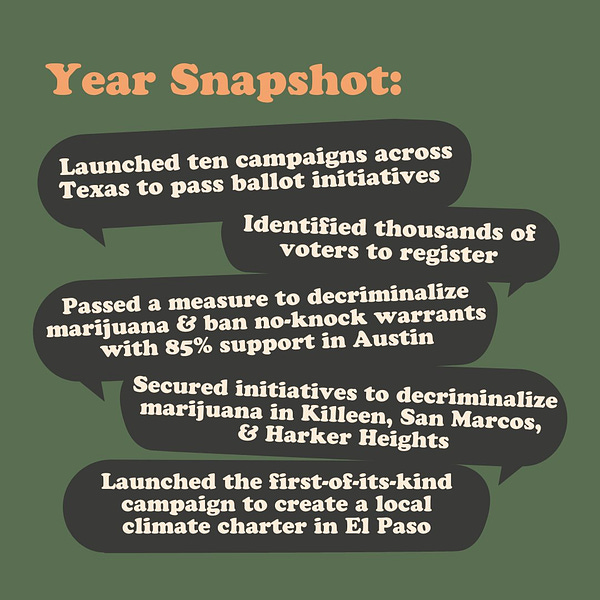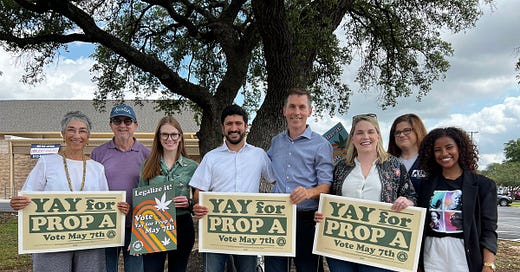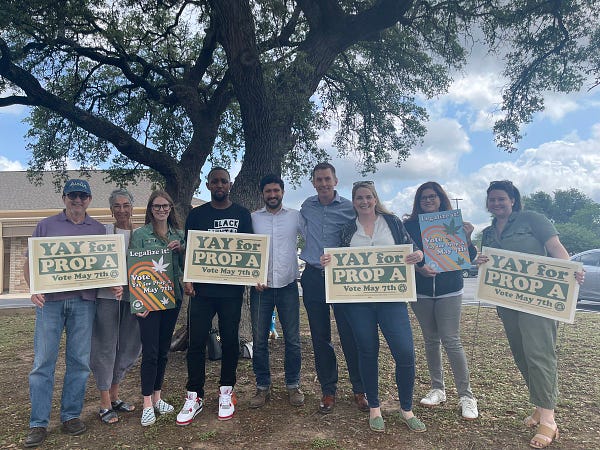Welcome to the big Sunday evening edition of Progress Report.
A sense of dread and doom now loom over Sunday evenings, and the specter of the Supreme Court issuing catastrophic decisions grows with each passing week.
It is inevitable that the high court’s majority, assembled by minority governments, will overturn Roe v. Wade and eviscerate states’ rights to enact gun control measures. There is no way to properly prepare for it. All that we can do is pledge to organize on the ground everywhere that abortion care is threatened in any way.
There’s no state where civil and health rights are more under fire than they are in Texas, and tonight, we’re taking a deep dive into an organization making real progress in the fight against state fascism.
Thank you to our latest crowd-funding donors: David and Charlene!
Last December, as the small team at Ground Game Texas reviewed the signed petitions that they’d collected around Austin, a curious trend began to emerge. Of the 34,000 people that signed their names in support of placing the Austin Freedom Act on the May ballot, approximately 5,000 of them were either registered to vote at an old address or simply not registered to vote at all.
Because the grassroots organization had collected more than enough signatures to qualify the initiative, which proposed decriminalizing marijuana and banning no-knock warrants, the discrepancies and disqualified names represented an opportunity instead of a hindrance.
“These are what we call hot leads when it comes to voter registration opportunities,” says Julie Oliver, Ground Game Texas’s co-founder. “We’re finding this in every city we’re working in, a fabulous opportunity to get folks registered to vote at their current addresses.”
In Texas, where Republicans have regularly thwarted registration efforts and last year passed a draconian new voter suppression law, these opportunities to sign up and engage new left-leaning voters are worth their weight in gold — so long as there are leaders with the wherewithal, capacity, and interest in converting them.
After passing the Austin initiative with 85% of the vote in May, Ground Game Texas will run ballot initiatives to decriminalize marijuana in at least four cities in November, ranging from the mid-sized military city of Killeen to smaller communities like the suburb of Harker Heights. They’re also co-running the campaign to pass a historic climate change charter amendment in El Paso, a city with a population of 700,00 that is 82% Hispanic.
Alone in the Lone Star State No More
There are a few ways to view the state of Texas’s social and political landscapes.
Optimists will point out that in 2020, Joe Biden scored more votes in Texas than any other Democratic nominee for President since Jimmy Carter won the state in 1976. The close presidential finish built on a 2018 election that saw several House seats turn blue and Beto O’Rourke come agonizingly close to evicting Ted Cruz from the Senate. Some of the state’s largest counties are run by Democrats, and Harris County, home to Houston, has seen reformers flip a slate of local offices.
On the other hand, Democrats didn’t flip any additional Texas seats in 2020, as Republicans made major inroads with Hispanic voters and turned out a fired-up base. Trifecta intact, the GOP then passed a vicious voter suppression law and gerrymanders that turned once-competitive districts into safe red seats.
All the while, they’ve been turning Texas into a theocracy with bans on books, abortion, and medical care for children.
The reality is somewhere in between: a state with a conservative tradition, a powerful and ruthless GOP, and a rapidly diversifying and liberalizing electorate that’s largely been failed by a feckless state Democratic Party.
Oliver and her co-founder, Mike Siegel, each ran for Congress in both 2018 and 2020. New to electoral politics, they had the deck stacked against them in ridiculously gerrymandered districts that were represented by very well-financed incumbents. Unbowed, they ran tireless campaigns that turned barely contested Republican turf into marquee races with shockingly close finishes.
The Democratic Party’s moratorium on door-to-door canvassing for most of the 2020 election cost candidates across the board, and for those in Texas, it was doubly devastating. Siegel and Oliver both far exceeded expectations in 2018 on the strength of enthusiastic volunteers and in-person events that doubled as building blocks for what they’d hoped could be a more permanent grassroots political infrastructure — a rarity in electoral politics.
Their disappointment and frustration quickly evolved into determination. In June of last year, the two former candidates launched Ground Game Texas, which would focus on organizing around economically populist ballot initiatives — “workers, wages, and weed,” the tagline went — and providing resources to local grassroots activists across a sprawling state with little progressive cohesion.
“One of the fundamental challenges we're facing is that Texas is not very well organized,” says Siegel. “We have a pretty weak state party. Compared to places like California, it does not have many nonprofit advocacy groups or full-time political organizers. And so I feel like, to some extent, we've been taking on the role of what some people think of as [the responsibilities of] state parties.”
Oliver is blunter about the Texas Democratic Party leadership, which came under fire from staffers who alleged mismanagement and incompetence in the wake of the disappointing 2020 election results. Simply put, there seems to be little institutional interest in grassroots organizing.
“It’s been complete silence [from party leadership],” Oliver says. “I was on one Zoom call with our state chair — he didn't even know who it was, and I ran for Congress twice. I was a red-to-blue candidate in his state and he had no clue who I was.”
This is the Long Game
The fight is personal to both Oliver and Siegel. Each has a trans child, putting their families at risk of being torn apart under orders from Gov. Greg Abbott. Oliver, who has four children, was a teenage mother who at one point ran away from home, an experience that fuels her urgency to store reproductive rights in a state that has made it hell for people to obtain health care even in the most dire of emergency circumstances.



Organizations around the state have become intimately familiar with Ground Game Texas, which partners with local groups on each of their ballot initiative campaigns. “We don’t go anywhere we haven’t been invited,” Siegel says. It was the NAACP that invited them to run the campaign in Harker Heights, a criminal justice organization that requested organizing help in San Marcos, and a decriminalization-focused group that called them into Denton.
Just how much they get involved in each campaign depends on the capacity of the local groups and in which ways they can be most effective. At a minimum, they do the backend work of verifying petition signatures — access to the state voter file is expensive and coveted, making this an invaluable service — and writing the initiative ordinances. In some cases, they run the whole thing, from hiring campaign managers and field directors to coordinating volunteers and staff.
Siegel is particularly involved in the climate charter in El Paso, which would rewire the city government, forcing it to adopt renewable energy, create new transparency requirements, and force it to consider the environment in nearly every decision it makes.
Ground Game Texas has also begun to use the petition signatures and voter registrations that they facilitate to support electoral campaigns. The first foray was a small but impactful one in Grand Prairie, where they used $5,000 to hire canvassers and help flip two city council seats for more progressive candidates.
This spring, they teamed up with the organization Lupe Votes to target voters on behalf of Michelle Vallejo, the progressive community leader that currently holds a 40-vote lead in the Democratic primary for Texas’s 15th Congressional district.
Every ballot initiative produces more data, more registered voters, and tighter community bonds, all of which are key building blocks for the sort of grassroots coalitions that survive past election day and grow into sustainable, politics-shifting forces. By rewarding collective action and creating tangible change, they also provide at least some evidence that American democracy is still viable and worthy of participation, which has been easy to doubt over the past six years.
Democratic donors still tend to pour money into marquee races to help candidates that either have little chance of winning (see: Amy McGrath), wind up with millions of dollars of unspent cash in the bank (Sara Gideon), or blow it all on TV ads that serve only to enrich consultants (see: most Democratic politicians).
Oliver and Siegel themselves admit that it was far easier to raise money for their races against a dirtbag used car salesman and the richest member of Congress, respectively, than for the unsexy work of organizing and coalition building. The argument should be obvious to people: Now the districts they turned into swing seats are even more gerrymandered, in part because there hasn’t been a sustained effort to create widespread political power in much of the state.
“We're literally fighting fascism in Texas. You're not going to beat that with one candidate or one cycle. This is the long game,” Siegel says. “Voter by voter, issue by issue, one signature at a time, we're going to build the foundation to change Texas. We're going to build the data set, we're going to build the practices, and we're going to build the muscle memory in local races to win Congressional, state, and presidential elections.”
Wait, Before You Leave!
Progress Report has raised over $6.4 million dollars raised for progressive Democratic candidates and causes. We’ve also brought invaluable attention to issues in communities that are ignored by the national media. Isn’t that cool?
None of that money goes to producing this newsletter or all of the related projects we put out there. Not a dime! In fact, it costs me money to do this. So to make this sustainable, hire new writers, and expand to report out more stories, I need your help.
For just $5 a month, you can buy a premium subscription that includes:
Premium member-only newsletters filled with important news
Exclusive updates from candidates and interviews with other progressive leaders.
The satisfaction of financing new projects and paying new reporters
A new best friend (me).
A free subscription for a reader on a fixed income or a very tight budget
You can also make a one-time donation to Progress Report’s GoFundMe campaign — doing so will earn you a shout-out in an upcoming edition of the big newsletter!








I have been donating to Ground Game Texas since they were first brought to my attention, and agree that the Democratic Party seems to be utterly ineffectual at creating a message that resonates with voters, supporting progressive candidates or creating voter engagement. I would like to donate to other ground game organizations that you feel are effective. Can you recommend any other organizations that I might support (I also support Stacey Abrams Fair Fight)? I have stopped donating to DCCC and DSCC, they seem to be counterproductive.